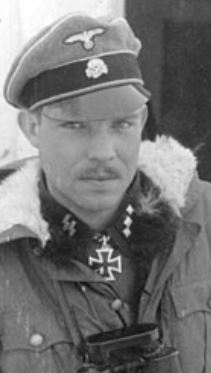Dahlke, Hermann (Waffen SS)
- Date of birth:
- February 17th, 1917 (Greifswald/Pommern, Germany)
- Date of death:
- July 5th, 1943 (near Rakovo, Bjelgorod, Ukraine)
- Buried on:
- German War Cemetery Kharkiv
Plot: 10. Row: 15. Grave: 1751. - Service number:
- SS-Nr.: 265.202 // NSDAP-Nr.:
- Nationality:
- German
Biography
Herrmann Otto Adolf Dahlke
00.00.1933: Hitlerjugend
RAD
joined the SS, SS-Leibstandarte 'Adolf Hitler'
00.03.1943: SS-Oberscharführer, Kharkov
06.03.1943: promoted to SS-Untersturmführer, Führer, 3. Kompanie, SS-Panzergrenadier-Regiment 1, 1. SS-Panzergrenadier-Division 'LSSAH'
05.07.1943: KIAnorth west of Rakovo near Belgorod
Do you have more information about this person? Inform us!
- Period:
- Second World War (1939-1945)
- Awarded on:
- July 8th, 1940
- Period:
- Second World War (1939-1945)
- Awarded on:
- August 3rd, 1941
- Period:
- Second World War (1939-1945)
- Awarded on:
- December 3rd, 1941
- Period:
- Second World War (1939-1945)
- Awarded on:
- February 23rd, 1942
- Period:
- Second World War (1939-1945)
- Awarded on:
- September 17th, 1942
- Period:
- Second World War (1939-1945)
- Rank:
- SS-Oberscharführer der Reserve (Staff Sergeant of Reserves)
- Unit:
- Führer, 3. Kompanie, SS-Panzergrenadier-Regiment 1, 1. SS-Panzer-Division 'LSSAH'
- Awarded on:
- March 3rd, 1943
“SS-Oberscharführer der Reserve Dahlke served in the Polish campaign as a messenger and later in the campaigns in France and the Balkans as a Kompanie HQ squad leader. During the operations of the LSSAH in Russia in the time period 28.06.1941-31.05.1942 he served first as a squad leader and later as a Zugführer.
During all these combat operations Dahlke has distinguished himself as an exemplary soldier with high military virtues, and for his outstanding deeds of bravery he was awarded the Iron Cross First Class. On the 14.02.1943 Dahlke achieved a feat-of-arms that was decisive for the course of the attack of Kampfgruppe Witt (consisting of the I./Pz.Gren.Rgt. 1, 3./Pi.Btl., a Sturmgeschütz-Batterie and an Artillerie group) against the village of Bereka (55 km south of Kharkov).
Kampfgruppe Witt had the mission of attacking the positions of much larger enemy forces in and around Bereka. The attack objectives for I. Bataillon were Hills 163, 189.2 and 134.8, all on the southwestern edge of the village. 3. Kompanie, to which SS-Oberscharführer Dahlke belonged, was echeloned to the right and rear and had the mission of covering the open right flank of the attacking Bataillon. In order to fulfill this mission 3. Kompanie attacked the entrenched enemy on Hill 197.7 after overcoming its first attack objective (Hill 163).
Dahlke and his Zug were deployed to the left and front of this attack. Thanks to Dahlke’s energy and inspiring example his men were able to break into the enemy position via an energetic attack, and they succeeded in ejecting the approximately company-sized enemy force (supported by heavy machine-guns) after a brutal and partially close-quarters battle. The swift capture of the commanding Hill 197.7 was above all thanks to the boldness of SS-Oberscharführer Dahlke, and the elimination of this dangerous flank threat meant that the Kampfgruppe got off to a very good start at the very first stage of its assault.
In the further course of the attack a number of major obstacles were encountered, including significant terrain difficulties, very deep snow and ravines that could only be traversed very slowly. The result was that an unforeseen delay occurred while bringing up the heavy weapons and artillery forward observers. And this in turn temporarily placed the rifle Kompanien (which had just reached a very steep cliff in front of the distant southwest part of the village) in a very bad situation. The numerically superior enemy forces on the village edge unleashed heavy rifle, MG and mortar fire that pinned down the Kompanien in the completely open terrain. 3. Kompanie was particularly hard hit, and its commander and only other officer became casualties. Dahlke and his decimated Zug found themselves far ahead on the front slope as the enemy launched a counterthrust from the flank with major forces. Having been informed of the demise of the Kompanie commander, and clearly recognizing the dire situation of his Kompanie, Dahlke took over command of the unit on his own initiative. Disregarding the danger to his life created by the heavy enemy fire, he gathered up his Kompanie for defense and repulsed the enemy counterthrust. Even as all the machine-guns and some of the riflemen ran out of ammunition, Dahlke continued to put up a spirited resistance until the enemy were finally forced to fall back.
If the enemy had recaptured Hill 197.7 they would have assumed control of a commanding position that would have allowed them to pour fire from the rear against the already pinned down Kompanien. This would have most likely inflicted very heavy losses on both the Bataillon and the remaining elements of the Kampfgruppe. However this did not come to pass thanks to the brave actions by SS-Oberscharführer Dahlke.
Dahlke (who was wounded for the third time on the 17.02.1943) is an unnaturally brave and determined fighter who is fully worthy of the award of the Knight’s Cross to the Iron Cross.”
- Period:
- Second World War (1939-1945)
Sources
- Photo 1:
- - MOONEY, PETER, Waffen-SS Knights and their Battles, Schiffer Publishing, Ltd, 2010.
- THOMAS, FRANZ & WEGMANN, GüNTER, Die Ritterkreuzträger der Deutschen Wehrmacht 1939-1945, Biblio Verlag, Osnabrück, 1998.
- Die Ordensträger der Deutschen Wehrmacht - https://forum.axishistory.com/viewtopic.php?f=38









